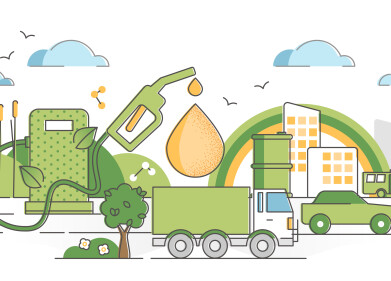Biofuel Industry News
Introducing the Newest Renewable — Propane
Sep 25 2014
Propane is a hydrocarbon with the chemical formula C3H8. It belongs to a group of chemicals known as alkanes that are all related by the formula CnH2n+2. Other important alkanes include methane, ethane and butane that are all used, like propane, as fuels.
Propane Uses
Although propane is used as a gas, it is a very easy to liquefy for storage and transport — it also reverts back to a gas immediately on release from storage. This gives it advantages over other fuels that require chilling and pressurization equipment to convert to liquid form.
Propane, along with butane, is used extensively as a portable fuel because of the advantages outlined above. It is also used as a fuel in some vehicles. Vehicles that run on liquefied petroleum gas (LPG) run on propane or butane or more usually a mix of the two.
Because of its ease of storage and use, propane can be used extensively as a fuel for cooking and heating in communities not served by the traditional gas or electric networks.
Current Production Methods
The majority of propane is currently produced as a by-product of natural gas production, along with butane and ethane. Propane can also be produced as a by-product of refining petroleum. Both of these processes use fossil fuels as a precursor.
Renewable Biofuels
New ways to make fuels are being investigated continually. Fossil fuels cannot last forever, and the impact on the Earth’s climate change has to be addressed. One area of research is into the production and use of biofuels. Currently, renewable biofuels do not contribute much to the energy mix and they have attracted some criticism over the use of land that could be used provide food. See the article, Biofuel Production Declines, for a discussion on the current global biofuel situation.
Recently, a team from Finland and the UK have published a paper suggesting a new method to produce renewable propane. In Kallio, P. et al. An engineered pathway for the biosynthesis of renewable propane published in Nature Communications, the team report on a synthetic metabolic pathway to propane, the first such report.
Although biosynthesis has been used to synthesize other alkanes, usually medium to long chained alkanes, no pathways existed to make short chained alkanes used as fuels. The team focused on making propane because of its wide use as a fuel and its property of being gaseous at ambient temperatures.
Pathway for Synthetic Propane
The biosynthesis of alkanes makes use of the discovery of an enzyme called aldehyde deformylating oxygenase (ADO). Enzyme’s are proteins, and are simply a biological catalyst; they speed up or allow a specific reaction to take place. The team developed a pathway so the synthesis takes place in an oxygen environment, meaning that the process could take place in photosynthetic hosts. This could lead to processes that convert solar energy into chemical energy. Only a small amount of propane was generated, but a similar approach could be used to manufacture other fuels.
Digital Edition
PIN 25.5 Oct/Nov 2024
November 2024
Analytical Instrumentation - Picturing Viscosity – How Can a Viscometer or a Rheometer Benefit You? - Sustainable Grease Formulations: Evaluating Key Performance Parameters and Testing Method...
View all digital editions
Events
Nov 26 2024 Paris, France
Nov 26 2024 Amsterdam, Netherlands
Nov 27 2024 Istanbul, Turkey
Biogas Convention & Trade Fair 2024
Nov 27 2024 Hanover, Germany
Dec 03 2024 Dusseldorf, Germany



















